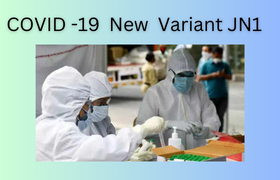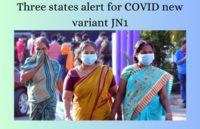Latest Information on COVID Subvariant JN1
COVID Subvariant JN1, also known as Variant JN1, has emerged as a significant focus in the ongoing battle against the COVID-19 pandemic. Understanding the nuances of this variant is crucial to comprehending its impact on public health, transmission dynamics, and measures required for containment.

The latest update from official sources has revealed a concerning trend – the detection of 19 cases of COVID-19 sub-variant JN.1 in Goa, alongside isolated instances in Kerala and Maharashtra. This development has sparked heightened surveillance and concern among health authorities and the general populace.
Discover 21 confirmed cases of COVID-19 Sub-Variant JN.1 across the nation. No cause for alarm, assures NITI Aayog member Dr V K Paul.
The recent official update highlights the identification of 19 cases of COVID-19 Sub-Variant JN.1 in Goa and single cases in Kerala and Maharashtra. Alongside this, 16 COVID-19-related deaths have occurred, with victims having significant comorbidities.
“The directive from the Centre urges states and union territories to uphold a continuous vigilance strategy, especially with the recent surge in COVID-19 instances and the identification of the novel JN.1 variant within the nation.”
“During the midweek, Health Minister Mansukh Mandaviya orchestrated an exhaustive evaluation of nationwide healthcare systems, stressing the vital necessity for increased readiness in combating the evolving strains of the coronavirus.”
Understanding COVID Subvariant JN1
Characteristics and Genetic Makeup
COVID Subvariant JN1 represents a mutation within the SARS-CoV-2 virus, showcasing specific alterations in its genetic composition. Its distinct genetic markers differentiate it from the original strain, contributing to potential alterations in transmissibility, severity, and immune response.
Researchers are actively analyzing JN1’s genetic structure to identify key changes that might influence its behavior, transmission rates, and effectiveness of current vaccines. These alterations could potentially affect the efficacy of existing treatments and preventive measures against this subvariant.
Spread and Transmission
The transmission dynamics of COVID Subvariant JN1 remain under scrutiny. Preliminary studies suggest that the variant may possess altered transmission rates compared to earlier strains. Understanding how rapidly and efficiently JN1 spreads among populations is crucial in devising effective containment strategies.
Moreover, investigations into potential differences in symptoms, severity, and the risk of reinfection associated with JN1 are ongoing. Identifying these aspects aids in early detection, isolation, and treatment protocols to curb its spread and mitigate its impact on public health.
Impact on Public Health
The impact of COVID Subvariant JN1 on public health systems and healthcare infrastructure is a topic of significant concern. Variants with distinct characteristics can pose challenges in managing and containing the spread of the virus. The implications of JN1’s emergence on vaccination effectiveness and the development of targeted therapeutics are key considerations.
Health authorities are closely monitoring the potential surge in cases due to JN1 and preparing response measures to handle any increased strain on healthcare facilities. Continuous surveillance and data collection are crucial in understanding the variant’s behavior and making informed decisions regarding public health interventions.
Differentiating JN1 from other COVID Variants
Distinguishing COVID Subvariant JN1 from other prevalent variants, such as Delta or Omicron, is essential for accurate tracking and management. Analyzing genetic differences, transmission rates, and clinical impacts aids in developing specific strategies to combat JN1.
Understanding the unique characteristics of each variant allows health officials to tailor responses and allocate resources effectively. Moreover, it assists in enhancing surveillance efforts, enabling early detection and containment measures.
Preventive Measures and Vaccination
Effective preventive measures play a pivotal role in controlling the spread of COVID Subvariant JN1. Emphasizing the importance of vaccinations, practicing hygiene protocols, maintaining social distancing, and adhering to local health guidelines remain critical in mitigating the impact of this variant.
Continuous research and adaptation of vaccination strategies to tackle emerging variants are imperative. Public awareness campaigns that highlight the significance of vaccination and adherence to safety measures are instrumental in curbing the spread of JN1 and preventing potential surges in infections.
